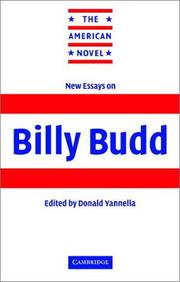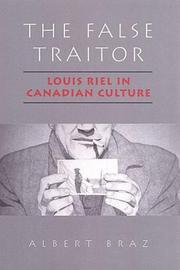| Listing 1 - 4 of 4 |
Sort by
|

ISBN: 1107111846 1280151749 0511116047 0511039395 0511147856 0511325711 0511613741 0511052596 9780511039393 0521417783 9780521417785 0521428297 9780521428293 051103735X 9780511037351 9780511116049 9780511613746 9780511052590 9780511147852 9786610151745 6610151741 9781107111844 9781280151743 9780511325717 Year: 2002 Publisher: Cambridge, UK New York, NY Cambridge University Press
Abstract | Keywords | Export | Availability | Bookmark
 Loading...
Loading...Choose an application
- Reference Manager
- EndNote
- RefWorks (Direct export to RefWorks)
Billy Budd is Herman Melville's most read work after Moby-Dick. Melville wrote the novella during the 5 years before his death, and it was published posthumously in 1924. The essays collected here provide a multifaceted introduction to the work. Areas investigated include nineteenth-century political and social dynamics and the literary response they provoked, as well as the relevance of mythology and the histories of classical world and Judaeo-Christian civilization to Melville's book. Also examined are Melville's later writing, including the late poetry, the text's development, and its ambiguities. This collection will prove an invaluable resource for students of this major American writer.
Sea stories, American --- Executions and executioners in literature. --- Impressment in literature. --- Sailors in literature. --- Seamen in literature --- History and criticism. --- Melville, Herman, --- Melville, Herman --- Arts and Humanities --- Literature
Book
ISBN: 1609381033 9781609381035 1609380886 9781609380885 Year: 2012 Publisher: Iowa City University of Iowa Press
Abstract | Keywords | Export | Availability | Bookmark
 Loading...
Loading...Choose an application
- Reference Manager
- EndNote
- RefWorks (Direct export to RefWorks)
The first work to combine literary criticism with other forms of death penalty-abolitionist writing, Demands of the Dead demonstrates the active importance of literature and literary criticism to the struggle for greater justice in the United States. Gathering personal essays, scholarly articles, and creative writings on the death penalty in American culture, this striking collection brings human voices and literary perspectives to a subject that is often overburdened by statistics and angry polemics. Contributors include death-row prisoners, playwrights, poets, activists, and literature.
Capital punishment --- Executions and executioners in literature. --- Capital punishment in literature. --- Prisoners' writings, American. --- Abolition of capital punishment --- Death penalty --- Death sentence --- Criminal law --- Punishment --- Executions and executioners --- American prisoners' writings --- American literature --- Moral and ethical aspects
Book
ISBN: 1421413337 1421413329 9781421413334 9781421413327 1421429268 9781421429267 Year: 2014 Publisher: Baltimore
Abstract | Keywords | Export | Availability | Bookmark
 Loading...
Loading...Choose an application
- Reference Manager
- EndNote
- RefWorks (Direct export to RefWorks)
"In Literary Executions, John Barton analyzes nineteenth-century representations of, responses to, and arguments for and against the death penalty in the United States. The author creates a generative dialogue between artistic relics and legal history. Novels, short stories, poems, and creative nonfiction engage with legislative reports, trial transcripts, legal documents, newspaper and journal articles, treatises, and popular books (like The Record of Crimes and The Gallows, the Prison, and the Poor House), all of which participated in the debate over capital punishment. Barton focuses on several canonical figures--James Fenimore Cooper, Nathaniel Hawthorne, Lydia Maria Child, Walt Whitman, Herman Melville, and Theodore Dreiser--and offers new readings of their work in light of the death penalty controversy. Barton also gives close attention to a host of then-popular-but-now-forgotten writers--particularly John Neal, Slidell MacKenzie, William Gilmore Simms, Sylvester Judd, and George Lippard--whose work helped shape or was in turn shaped by the influential anti-gallows movement. As illustrated in the book's epigraph by Samuel Johnson -- "Depend upon it Sir, when a man knows he is to be hanged in a fortnight, it concentrates his mind wonderfully" -- Barton argues that the high stakes of capital punishment dramatize the confrontation between the citizen-subject and sovereign authority. In bringing together the social and the aesthetic, Barton traces the emergence of the modern State's administration of lawful death. The book is intended primarily for literary scholars, but cultural and legal historians will also find value in it, as will anyone interested in the intersections among law, culture, and the humanities"--
Capital punishment in literature. --- Executions and executioners in literature. --- American literature --- Capital punishment --- Public opinion --- History and criticism. --- Public opinion. --- Moral and ethical aspects --- History. --- Abolition of capital punishment --- Death penalty --- Death sentence --- Criminal law --- Punishment --- Executions and executioners --- Legal history

ISBN: 144268125X 9781442681255 0802047602 9780802047601 0802083145 9780802083142 Year: 2003 Publisher: Toronto, Ont. University of Toronto Press
Abstract | Keywords | Export | Availability | Bookmark
 Loading...
Loading...Choose an application
- Reference Manager
- EndNote
- RefWorks (Direct export to RefWorks)
The most comprehensive treatment of the representations of Louis Riel in Canadian literature, The False Traitor will be a seminal work in the study of this popular Canadian figure.
Canadian literature --- History and criticism. --- Riel, Louis, --- Riel, Louis David, --- Riel, David, --- In literature. --- Canada. --- Canada (Province) --- Canadae --- Ceanada --- Chanada --- Chanadey --- Dominio del Canadá --- Dominion of Canada --- Jianada --- Kʻaenada --- Kaineḍā --- Kanada --- Ḳanadah --- Kanadaja --- Kanadas --- Ḳanade --- Kanado --- Kanakā --- Province of Canada --- Republica de Canadá --- Yn Chanadey --- Riel Rebellion, 1885 --- French-Canadian literature --- Executions and executioners in literature. --- Politics and literature --- Literature and history --- Trials (Treason) in literature. --- Revolutionaries in literature. --- Politicians in literature. --- Metis in literature. --- Literature and the rebellion. --- Northwest Resistance, Canada, 1885 --- Métis in literature.
| Listing 1 - 4 of 4 |
Sort by
|

 Search
Search Feedback
Feedback About UniCat
About UniCat  Help
Help News
News